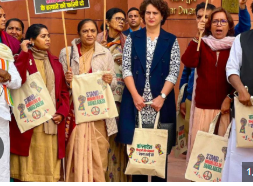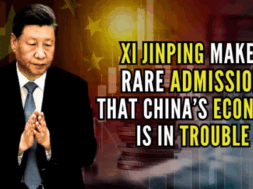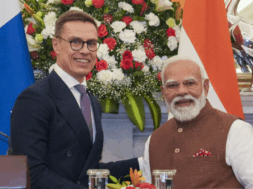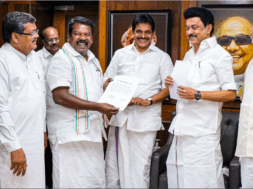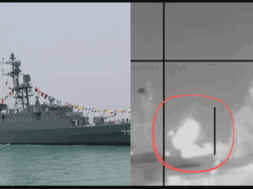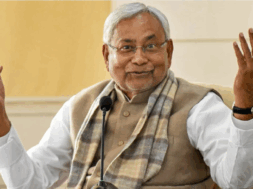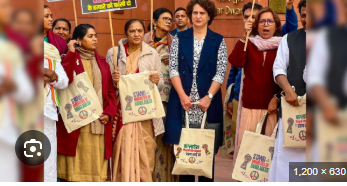
Manas Dasgupta
NEW DELHI, Dec 17: A day after her handbag featuring the word “Palestine” sparked a controversy in Parliament, the Congress MP from Wayanad MP Priyanka Gandhi Vadra on Tuesday made a statement once again as she walking into Parliament with a new bag carrying a slogan on the plight of minorities in Bangladesh.
The message “Bangladesh ke Hindus and Christians ke saath khade ho” (Stand with the Hindus and Christians of Bangladesh) was prominently displayed on her bag, in reference to the incidents of attacks on minorities in Bangladesh following the ouster of former prime minister Sheikh Hasina earlier this year.
This comes after a similar gesture on Monday, when Priyanka’s bag featured a ‘Palestine’ tag, expressing her solidarity with Palestine. The Wayanad MP, along with other opposition leaders, protested outside Parliament against the mistreatment of minorities in Bangladesh. They raised slogans calling on the government to ensure justice for these communities.
Priyanka Gandhi’s “bag move” inspired other Opposition MPs to carry similar bags and protest in unison. Many carried cream-coloured handbags, and several members were seen holding placards and bags, all showing support for the minorities affected by ongoing atrocities in Bangladesh.
Even in the Lok Sabha on Monday, Priyanka had raised the issue of the safety and security of both Hindus and Christians in Bangladesh. In her address during the Zero Hour in the Lok Sabha, Priyanka Gandhi had called upon the government to raise the issue of atrocities against minorities in Bangladesh. She urged the Centre to engage diplomatically with Dhaka to ensure the safety of Hindus and Christians.
“The government should raise the issue of atrocities on minorities, both Hindus and Christians, in Bangladesh. We should discuss this with the Bangladesh government and support those who are in pain,” she had said.
Priyanka Gandhi’s choice of accessories has become a point of political debate. Her handbag from the previous day, with “Palestine” inscribed on it alongside a watermelon, a widely recognised symbol of solidarity with the Palestinian cause had triggered sharp reactions from the ruling BJP.
When questioned about the controversy over her “Palestine” bag, Priyanka Gandhi dismissed the BJP’s criticism. “Who is going to decide what clothes I wear now? Who is going to decide that? That’s typical patriarchy that you decide what women wear also. I don’t subscribe to that. I will wear what I want,” she said. “I have said many times what my beliefs are regarding this. If you look at my Twitter handle, all my comments are over there.”
The visit by Palestinian Embassy representative Abed Elrazeg Abu Jazer to her residence a day before added to the BJP’s accusations of “communal posturing.” Several BJP leaders seized on the issue, framing it as an attempt to prioritise foreign concerns over domestic issues.
“Was the bag a statement? Why has she kept mum on issues of Bangladeshi Hindus? It is a big question mark,” Mr Anurag Thakur had asked. “It is an Indian Parliament. MPs are elected here from across the country to try and raise the concerns of 140 crore Indians. First, it was Asaduddin Owaisi who raised a ‘Jai Palestine’ slogan, and now it is Priyanka Gandhi who brought a Palestine bag to Parliament.”
Amit Malviya, head of the BJP’s IT cell, accused the Wayanad MP of “communal virtue signalling” under the guise of countering patriarchy. “At the end of this Parliament session, observe a two-minute silence for everyone in the Congress who believed Priyanka Vadra was the solution. Sporting a bag in support of Palestine in Parliament is crass communal posturing,” Malviya posted on X.
Priyanka Gandhi, however, was quick to hit back at her critics. “Tell them to do something about the atrocities on Hindus in Bangladesh, talk to the Bangladesh government, and not say stupid things,” she retorted. Recalling India’s intervention in the 1971 Bangladesh Liberation War under the leadership of then prime minister Indira Gandhi, Priyanka Gandhi said, “The fight that we had fought (in 1971) was about principles, for democracy, against the atrocities that were being committed. These principles made India great. Our independence struggle was also based on these principles. We were alone at that time.”
“Indira ji travelled across the globe, saying this atrocity must be stopped. Nobody stood up but our country did. Indira ji did, our army did and our people stood up,” she added. India has long supported a two-state solution, advocating for the establishment of an independent Palestinian state alongside Israel.
External Affairs Minister S Jaishankar reaffirmed this position in Parliament, last week stressing India’s commitment to a “sovereign, independent, and viable Palestinian state.” Responding to allegations of India abstaining from UN resolutions on Gaza, Mr Jaishankar clarified that India had supported 10 of 13 resolutions concerning Palestine at the UN General Assembly since the Israel-Hamas conflict began in October 2023.
India has also provided significant humanitarian aid to Palestine. Since the onset of the conflict, the Centre has delivered approximately 70 metric tonnes of relief materials, including medicines, and contributed $5 million to the United Nations Relief and Works Agency (UNRWA) for Palestinian refugees. India also shares close historical and strategic ties with Bangladesh. However, recent reports of attacks on minorities following the ouster of former prime minister Sheikh Hasina have drawn concerns.
Meanwhile, the Indian Army on Tuesday responded to the controversy over the removal of the painting of Pakistan surrendering before India after the 1971 Bangladesh War from its headquarters. It said the iconic picture was not removed, but moved to its “most befitting place” on the occasion of Vijay Diwas on December 16.
The issue was raised in the Lok Sabha on Monday by Ms Priyanka Gandhi who said the painting was removed from the army headquarters. “Today, that picture has been removed from the Army headquarters where the Pakistan Army is surrendering before the Indian Army,” she had said. A controversy erupted soon after, but the army said the painting, in fact, has been moved to a new location — the Manekshaw Centre, named after the “architect and hero” of the 1971 war. The Additional Directorate General of Public Information (ADG PI) of the Indian Army posted the information on its official handle on X.
It further said the painting was installed at the Manekshaw Centre in New Delhi by Chief of Army Staff General Upendra Dwivedi and AWWA president Sunita Dwivedi. “On the occasion of Vijay Diwas, General Upendra Dwivedi COAS, along with the President AWWA, Mrs Sunita Dwivedi, installed the iconic 1971 surrender painting to its most befitting place, The Manekshaw Centre, named after the Architect and the Hero of 1971 War, Field Marshal Sam Manekshaw. Senior hierarchy & serving officers of #IndianArmy and #Veterans were present on this occasion,” the ADG PI-Indian Army said.
The army also said installing the painting at the Manekshaw Centre will benefit a larger audience, and people from all walks of life as well as international visitors will have access to it. It added: “This painting is a testament to one of the greatest military victories of Indian Armed Forces and the commitment of India for justice & humanity for all. Its placement at the Manekshaw Centre New Delhi will benefit a large audience due to substantial footfall of diverse audience & dignitaries from India and abroad at this venue.”
